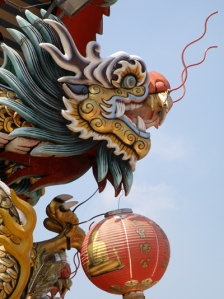 As the year of the water dragon sweeps in on Monday the 23rd of January, 2012, Inchin Closer wonders what the new year will bring. Feng Shui experts, financial gurus and stock market soothsayers predict a year with major upheavals, with the first six months of the year being slow and melancholy and the pace picking up only post summer.
As the year of the water dragon sweeps in on Monday the 23rd of January, 2012, Inchin Closer wonders what the new year will bring. Feng Shui experts, financial gurus and stock market soothsayers predict a year with major upheavals, with the first six months of the year being slow and melancholy and the pace picking up only post summer.
The year of the dragon, the Chinese zodiac’s most powerful and only mythical creature symbolizes international conflicts and earth related disasters – such as tsunamis and earthquakes, while its element, water also depicts fear in the economy (2008 was also a water year), also a strong contrast against fire, the element which is usually associated as a driving force behind the economy.
In terms of personal matters, the Year of the Dragon will be a good time for people to get married, have children or begin a business venture as the year tends to bring good fortune and happiness. Business should go well and people will make money more easily this year.
Further, the industries that will perform well in the year of the Dragon will be industries related to Wood and Earth elements. Wood industries are textile, fashion, consumer products, paper, books, environment industry, forestry, furniture etc. Earth industries include mining, construction and natural resources.
For politics, its predicted to be another year of upheaval with elections taking place in the United States, Russia, Taiwan, France and India. Such elections also provide drive for progress, changes and courageous reforms. Additionally, In autumn 2012, the 18th National Congress of the Communist Party of China will elect the new Central Committee and Politburo Standing Committee members. The current President Hu Jintao and Premier Wen Jiabao are due to step down from the Standing Committee to make way for the next generation of leaders from whom the new Chinese president and premier will be appointed in March 2013.
As regards, China-India relations, the two countries are expected to fortify their relationship, with increased high level exchanges, a better understanding, growth and prosperity in the region. The dragon is also one symbol that strongly links the two nations as has been discovered by Tan Chung – in his latest book – Across the Himalayan Gap, Chung explains – On the Indian snake – Chinese dragon connect: One common symbol is the powerful snake whose legendary image is known as Nagaraja in India, and LonglDragon in China. In Chinese Buddhist literature, these two symbols have merged into “Long”. (Chinese translators, like the famous pilgrim Xuanzang, rendered the supernatural Naga in ancient Indian texts into Long/dragon on purpose.) Ancient Chinese heard about the magical power of Indians to call rains whenever they wanted. Some Indian Buddhist monks, like Vajrabodhi and Amoghavajra etc., demonstrated such a power by playing with the symbol of NagalDragon. We have records of Indian monks presiding over imperial rain-invoking ceremonies when China was visited by severe drought in the years 366, 726, 772 and 889, the last occurred in independent Yunnan -the state of Nanzhao.2 Both India and China were agrocultures for which rain-fall assumed great importance. The imaginary powerful Naga /Dragon symbol definitely had a connection with it. We can describe the two civilizations as Snake-Power Twins before the advent of Buddhism in China.
Lastly, if you are in India and want to join in the festivities of the Chinese New Year, head to the Chinese temple in your city, obscure, but brimming with life on the morning of the 23rd, Chinese Indians will be out to welcome in the new year. After a day of prayer and family feasting on Sunday, the Chinese dress up and head to the Chinese temple to seek best wishes for the new year. Word has it that this year the few remaining Chinese in Kolkata’s Chinatown are planning an exceptional parade and festivities. Head East if you want to be part of this once in a lifetime experience!
